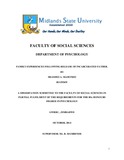Please use this identifier to cite or link to this item:
https://cris.library.msu.ac.zw//handle/11408/2615Full metadata record
| DC Field | Value | Language |
|---|---|---|
| dc.contributor.author | Madondo, Shamiso A. | - |
| dc.date.accessioned | 2017-07-11T13:34:53Z | - |
| dc.date.available | 2017-07-11T13:34:53Z | - |
| dc.date.issued | 2014 | - |
| dc.identifier.uri | http://hdl.handle.net/11408/2615 | - |
| dc.description.abstract | Incarceration can be destructive yet it is not publicly talked about. The incarceration of a father makes one a widow/widower or orphan. The incarceration of a family member has serious repercussions and normally leads to family crises yet it seems to be taken for granted by the society, government and other stakeholders. This study generally sought to look at the experiences of the ex-convicts and their families, passive victims of incarceration. The design of this study was a phenomenological exploration which employed an in depth interview guide for the collection of qualitative data. Twenty (20) respondents who were ex-convicts and their spouses and (11) children in Chitungwiza, Harare, Norton and had spent at least 5 years in the prison and at least 3 years after release were interviewed. The study revealed that the incarceration of a father has rippling effects on their spouses, children even the father himself in life beyond walls. Some of the effects of incarceration on these groups include: trauma and psychological problems associated with prison life and poor reintegration, social stigma and subsequent redraw, poor school performance and high school drop-out rate, substance abuse in the case of children as well as changes in family composition and weakened parental ties. For the spouses of ex-convicts the effects of incarceration identified include: role changes, economic hardships as well as lack of intimacy, infidelity, HIV/AIDS issues and possible divorce due to resentment. The researcher recommends that the study be done in a quantitative research to increase sample size and use of other research tools besides interviews in sensitive subjects to allow openness. It is the hope of this researcher that this valued information will guide and influence policy formulation, in relation to the ex-convicts and their families who need to be considered in the total process of incarceration and life after prison. Modified prison conditions and practices as well as new programs are needed as preparation for release, during transitional periods of parole or initial reintegration, and as long-term services to insure continued successful adjustment. | en_US |
| dc.language.iso | en | en_US |
| dc.publisher | Midlands State University | en_US |
| dc.subject | Incaceration | en_US |
| dc.subject | Family relationships | en_US |
| dc.subject | Jailed fathers | en_US |
| dc.title | Family experiences following release of incarcerated father | en_US |
| item.fulltext | With Fulltext | - |
| item.languageiso639-1 | en | - |
| item.grantfulltext | open | - |
| Appears in Collections: | Bsc Psychology Honours Degree | |
Files in This Item:
| File | Description | Size | Format | |
|---|---|---|---|---|
| FINAL DISERTATION (3) 2014 (FINALLY) 2 FOR DISC.pdf | 830.33 kB | Adobe PDF |  View/Open |
Page view(s)
24
checked on Jul 26, 2024
Download(s)
12
checked on Jul 26, 2024
Google ScholarTM
Check
Items in MSUIR are protected by copyright, with all rights reserved, unless otherwise indicated.


